College Sports
Mason West commits to Michigan State
Mason West finished with 49 points in 31 games last season for Edina. He will forgo his senior hockey season and play for Fargo in the USHL, but will play football for the Hornets this fall. West listed No. 27 in final NHL Central Scouting rankings for North American skaters Mason West, highly sought on […]
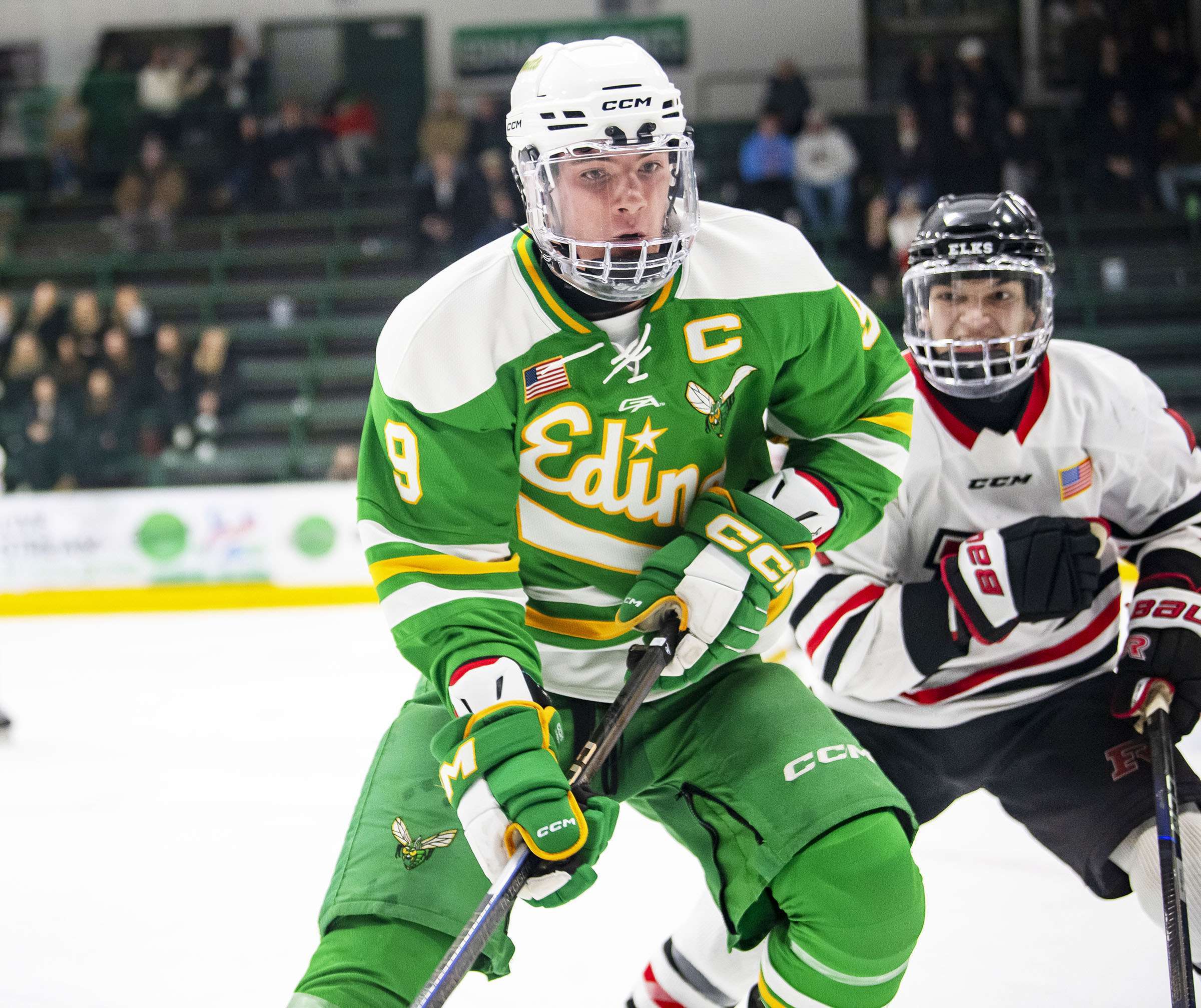

 Mason West finished with 49 points in 31 games last season for Edina. He will forgo his senior hockey season and play for Fargo in the USHL, but will play football for the Hornets this fall.
Mason West finished with 49 points in 31 games last season for Edina. He will forgo his senior hockey season and play for Fargo in the USHL, but will play football for the Hornets this fall.West listed No. 27 in final NHL Central Scouting rankings for North American skaters
Mason West, highly sought on both the gridiron and the ice, committed to play hockey at Michigan State Thursday.
West’s decision comes shortly after he announced he would pursue hockey beyond high school rather than football where is has been highly recruited as a quarterback. West announced recently he will forgo his senior season of hockey at Edina and join the USHL’s Fargo Force, but will still play his senior year of football this fall.

West was a member of the 2024 state champion Edina hockey team, but fell short of winning a football state title, finishing runner up in 2023 in a heartbreaking 28-27 loss to Centennial.
“It was really important for me to play football as a senior with my friends,” West said in an interview with NHL.com form the NHL Scouting Combine. “I always set goals for the year, and that was to win a state high school hockey championship and also a football championship. I haven’t done it in football so I kind of want to achieve that and stay loyal to my team because I think they need me.”
The 6”6’ West had 27 goals and 22 assists last season in 31 games during his junior season for the Hornets as a right wing. He joined the Fargo Force following the state tournament and recorded a goal and eight assists in 10 games. He is currently ranked No. 27 amongst North American skaters by NHL Central Scouting.
West turns 18 years old in early August.


College Sports
Hiring of Manuma as coach keeps legacy of Radford athletics alive
The first time Fred Salanoa left the helm as head football coach at Radford, the possibility of an eventual return was always there. He guided Radford to the Division II state championship in 2016, then stepped away to stay close as his three daughters embarked on their prep soccer careers. Advertisement Advertisement Advertisement The former […]



The first time Fred Salanoa left the helm as head football coach at Radford, the possibility of an eventual return was always there.
He guided Radford to the Division II state championship in 2016, then stepped away to stay close as his three daughters embarked on their prep soccer careers.
Advertisement
The former Radford and Eastern Washington quarterback returned in 2019, rebuilding a winless program back to competitiveness.
Salanoa stepped down after the 2024 season, closing with a career mark of 90-77 (.539 ). Radford kept the decision in house, went through the rigors of the hiring process and selected assistant coach Mason Manuma as head coach in January.
“We have a culture that is very different because of our military population. I don’t think there’s anything comparable, ” Salanoa said, noting that the student enrollment is 68 % military in origin.
Salanoa is now in a new position as assistant athletic director under longtime AD Kelly Sur.
Advertisement
This keeps the legacy of Radford athletics and football alive. Salanoa followed in the footsteps of John Velasco and Robert Stevens. Manuma will now follow the path taken by his uncle, Salanoa. He embraces the tradition of leadership as a Ram.
“Pressure is a privilege. Radford has a rich tradition athletically stemming back to Mr. Velasco and (basketball ) Coach (James ) Alegre. I’m excited for the challenge to uphold that trickled down with Coach Fred and Coach Sur, ” Manuma said. “I’m just excited to have my opportunity to add to that (trophy ) hallway in the gym.”
Salanoa’s three daughters are playing college soccer at three universities in different states this fall. He will have the freedom to visit them with his wife, Radford vice principal Malevine Salanoa.
“For me to be able to support our daughters in real time, I would have to leave the football team I’m in charge of, ” Salanoa said. “There’s a point and time we’ve got to make the best of our time with our family. We have to make sure that we keep our loved ones as close as possible, that they get love from us parents.”
Advertisement
Manuma played for the Rams and still remembers his last game on the field vividly. He suffered a fractured femur in Radford’s OIA D-II title game against Nanakuli in 2013.
“I got hurt on the second play from scrimmage. It was trips right, key 3. I was the No. 3 receiver, ran a bubble screen. Take it up the sideline, got the first down, tried to spin out of a tackle and my leg got caught, ” he recalled.
Manuma played at Snow Community College (Utah ), then returned home and went to work in the entertainment industry. In 2019 his uncle called his number.
“It was at an event, he asked me to come watch a 7-on-7 scrimmage during the summer. I gave him my notes for the offense, and my uncle Thor (Salanoa ) asked me for notes on the DBs, ” Manuma recalled. “I’ve been an educational assistant here at Radford since then.”
Advertisement
Now 30, Manuma is in the process of getting his degree in education and plans to become a world history teacher.
“I’ve had great tutelage from Coach Fred, as well as Coach Kelly Sur and my old coach, Lon Passos, and a lot of my former coaches still on staff here. I had great mentorship from them seeing behind the scenes the past couple of years.”
Extra points : The weekend was chock full of scrimmages across Oahu. On Friday, Aiea, Campbell and Kamehameha met in a tri-scrimmage at Kunuiakea Stadium. Both sides of the field were occupied with action. Aiea’s freshman quarterback Caizel Jesus Kapisi was impressive in his debut, playing with good instincts for second-year head coach Mika Liilii. He resembled a younger version of Damien’s 6-foot-2, 240-pound QB, AJ Tuifua.
Host Kamehameha was solid all around with left tackle Malakai Lee, the state’s most recruited offensive lineman who has committed to Michigan, setting the bar.
College Sports
Women's Soccer Named United Soccer Coaches College Team Academic Award Winner
Story Links KANSAS CITY, Mo. – The United Soccer Coaches announced Jacksonville University was named a College Team Academic Award winner for its 2024-25 academic year. The women’s soccer team boasted a program best 3.64 GPA, earning a spot on the national list. A team must maintain a season GPA of above a 3.0 to be […]



KANSAS CITY, Mo. – The United Soccer Coaches announced Jacksonville University was named a College Team Academic Award winner for its 2024-25 academic year.
The women’s soccer team boasted a program best 3.64 GPA, earning a spot on the national list. A team must maintain a season GPA of above a 3.0 to be awarded a United Soccer Coaches College Team Academic Award winner.
Of the 697 schools recognized, 414 were women’s teams. By setting a new program record, JU was among 151 schools nationwide to reset the student-athlete standard at their respective school.
The 2025-26 Dolphin soccer season kicks off at Southern Oak Stadium on August 14 against Jacksonville’s own Edward Waters University at 7 p.m.
College Sports
College Sports’ NIL Visa Gamble and the Lawyer Behind It
Sometimes, the key to interpreting the law lies not in what it says—but in what it leaves unsaid. In the summer of 2021, shortly after the NCAA adopted its interim name, image, and likeness (NIL) policy, Benjamin Snyder, a North Carolina-based immigration lawyer, received a call from a friend—an agent representing several college basketball coaches. […]

Sometimes, the key to interpreting the law lies not in what it says—but in what it leaves unsaid.
In the summer of 2021, shortly after the NCAA adopted its interim name, image, and likeness (NIL) policy, Benjamin Snyder, a North Carolina-based immigration lawyer, received a call from a friend—an agent representing several college basketball coaches. The agent had a pressing question: How could his coaching clients include international athletes in the evolving NIL landscape?
At the time, the prevailing belief was that international athletes—most of whom held F-1 student visas—were categorically excluded. U.S. immigration law largely prohibits F-1 visa holders from engaging in employment involving the performance of labor or services, and many assumed NIL deals with third parties fell squarely into that category. After all, the distinction between NIL and impermissible pay-for-play was supposed to hinge on what the athletes were doing to earn the money.
The conventional wisdom, then, held that international athletes could only participate in NIL activities while physically outside the United States.
But Snyder read the situation differently. After examining the legal landscape, he concluded that many NIL deals qualified as passive income rather than active employment—income that F-1 visa holders are not explicitly barred from receiving. Based on this interpretation, Snyder argued that international athletes could legally accept third-party NIL payments even while residing in the U.S.
That analysis proved to be welcome news to college coaches, especially in sports like basketball, who were eager to recruit international talent that might otherwise have turned professional overseas.
Snyder has since emerged a central figure in efforts to help Power 4 schools include international athletes in the revenue-sharing plans outlined in the House v. NCAA settlement. He says he has advised roughly a dozen institutions across the Big Ten, ACC and Big 12, offering guidance on how to structure contracts and ensure compliance with immigration law.
One key consideration: If revenue-sharing payments from schools to athletes are to be classified as passive income for immigration purposes, then recipients must properly withhold taxes in accordance with that classification.
Still, the first—and often most difficult—step is convincing campus international student services offices, which function as frontline immigration enforcers. But to date, he’s had nobody reject his guidance.
Immigration law, broadly speaking, is a complex and often contentious area of American jurisprudence. Snyder concedes that, in the absence of clear case law or administrative guidance, practitioners are largely navigating in the dark. Even so, he maintains that his legal theory would stand up well in court. In formulating his position, Snyder analyzed distinctions in the U.S. tax code between active earned income and passive royalty income—the latter being exempt from self-employment tax.
A critical precedent came from the 1983 Kramer v. Commissioner case, which explored whether royalty income qualified as earned income under the minimum tax rules. The Tax Court found that 70% of former tennis pro Jack Kramer’s endorsement deal with Wilson, based on royalties from racquets and merchandise bearing his name, constituted royalties tied to commercial use of his NIL. The remaining 30% was deemed compensation for personal services.
“That helps us demarcate where passive income ends and employment begins,” Snyder explained. “It’s in the performance of some activity, including activity to promote the product or the merchandise they are selling.”
Some leagues seem to be incorporating Snyder’s view into policies, at least passively. While the Big Ten Conference has taken no official stance on whether F-1 visa holders may receive House payments, it deliberately structured its template revenue-sharing agreement as a passive license, in part to accommodate international athletes.
However, not everyone is buying Snyder’s argument.
Ksenia Maiorova, a Florida-based lawyer who specializes in advising international college athletes, dismissed Snyder’s position as a “legal fiction.”
“I like Ben, he is a really nice guy, but I vehemently disagree with him on this legal position,” Maiorova said. “I believe it is form over substance.”
For Maiorova, the heart of the issue lies in the visa approval process itself—controlled by individual consular officers who wield broad discretion. And under the Trump administration’s heightened scrutiny, that discretion can become a serious obstacle.
Her concerns are shaped in part by conversations with former consular officers like Chris Richardson, who previously served as a visa chief for the State Department and conducted tens of thousands of visa application interviews. Richardson told Sportico that if he were assessing a prospective international college athlete with a revenue-sharing deal, he would have “a lot of concerns.”
“Most of these deals are being structured as passive income, and maybe that will work for some officers, but it doesn’t seem to pass the smell test,” said Richardson, now president and general counsel of immigration consultancy BDV Solutions. “You are literally doing the most active physical labor possible, and you are being paid for it.”
At the same time, Richardson acknowledged that immigration law often lags behind real-world developments. Some consular officers, he noted, may try to account for that.
So, would he approve an F-1 visa application involving athlete revenue-sharing?
“I would probably say yes,” Richardson admitted. “I would probably try to look at it as passive as possible. But for all officers, it is a bit of a stretch.”
Too much of a stretch, in Maiorova’s view.
Still, she concedes that her warnings are “not being heeded.” That was made clear at last month’s annual convention of the National Association of College Directors of Athletics (NACDA), where F-1 visas and revenue-sharing payments were a major topic of conversation.
“Institutions have come to believe—and I don’t think unreasonably—that NIL enforcement by the NCAA has no teeth,” she said. “Schools have gotten away with doing things the NCAA has specifically prohibited … and there has been little practical recourse.”
In this case, though, the enforcer isn’t the NCAA, or even the newly formed College Sports Commission. It’s U.S. Immigration and Customs Enforcement (ICE).
One Power Four school’s athletics compliance official, speaking anonymously, voiced fears that the issue could become a flashpoint in the broader immigration debate. He said his department has even conjured the possibility of ICE agents pulling an athlete off the court during a televised game.
In the early months of his second term, President Donald Trump has repeatedly attacked higher education, most notably through his administration’s legal battles with Harvard.
Yet, as Richardson pointed out, many of the universities now preparing to distribute House payments to F-1 athletes are public institutions in Trump-supporting states, complicating the politics of enforcement.
Snyder, for his part, remains confident in his legal reasoning but recognizes the inherent unpredictability of the system.
“I want to make clear that this analysis and application of law is rock solid,” he said. “But generally speaking, there is so much in the world of immigration that is subject to executive branch discretion and varying interpretation.”
With the current visa application cycle—typically starting in May—already underway, Snyder said that none of the F-1 applicants at his client schools have been denied. Several international athletes, he added, are already on campus.
Both Maiorova and Richardson believe the more secure path for athletes seeking revenue-sharing deals would be to apply for P-1A work visas, which are designed for “internationally recognized athletes.” The problem? That process is far more burdensome and not intended for students whose primary purpose is academic.
Maiorova is currently co-representing LSU women’s basketball player Last-Tear Poa, an Australian national, in a lawsuit against U.S. Citizenship and Immigration Services (USCIS) over its denial of her P-1 visa application. A federal judge is currently considering both sides’ motions for summary judgment.
Snyder noted that he, too, has represented elite international athletes whose P-1 applications were rejected.
Under the P-1A visa, professional athletes may enter the U.S. to compete in a specific event and participate in related promotional activities. That’s why foreign NBA players, for instance, can legally appear in commercials. But in the context of college athletics, Snyder said, U.S. immigration officials tend to view such promotional efforts as beyond the scope of competition—as “extra-extra-curricular activities,” in his words.
“We feel our position is very consistent with the very little bit we know about how USCIS thinks about this so far,” Snyder said. “But it’s still a very new and emerging area.”
College Sports
Salve Regina women’s hockey coach Lun back at alma mater as new women’s bench boss for UMass Boston – College Hockey
DAVID LUN (photo: Salve Regina Athletics). UMass Boston has announced the appointment of Beacons alum David Lun as the next head coach of the women’s hockey team. Lun returns to the harbor campus after serving as the head coach of the women’s hockey team at Salve Regina since Aug. 2020. Under his leadership, the Seahawks […]

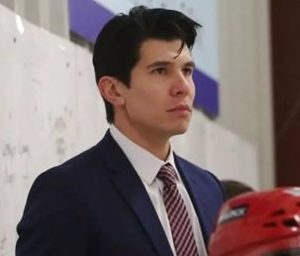
UMass Boston has announced the appointment of Beacons alum David Lun as the next head coach of the women’s hockey team.
Lun returns to the harbor campus after serving as the head coach of the women’s hockey team at Salve Regina since Aug. 2020. Under his leadership, the Seahawks posted their first winning season since 2014–15.
“We are thrilled to welcome David back to Beaconville,” said UMass Boston vice chancellor and director of athletics and recreation Dr. Jacqueline Schuman in a news release. “As both an alumnus and former student-athlete, he brings a deep understanding of our values and a clear vision for the future of our women’s hockey program. His track record of success, deep care and intentionality towards the development of student-athletes, team culture and community through sports, and drive towards championship level competitive excellence make him a tremendous addition to our department.”
“It’s an incredible honor to return to UMass Boston and lead this program,” Lun added. “This institution shaped me as a student and an athlete, and I’m excited to give back by helping these young women grow both on and off the ice. I look forward to building something special with this team.”
In his final season at Salve Regina, Lun guided the team to a 17–10–0 overall record and an impressive 14–4–0 mark in NEHC play, advancing to the conference semifinals. The team made major strides at both ends of the ice, improving its scoring average from 1.9 to 2.19 goals per game while reducing its goals-against average from 3.1 to just 1.6 during the 2024–25 season. For his efforts, Lun was named the NEHC coach of the year.
Prior to his time at Salve Regina, Lun spent three seasons as an assistant coach at Wesleyan, where he helped lead the Cardinals to their first-ever NESCAC tournament championship and NCAA tournament appearance in 2019–20.
In 2016, Lun served as the head coach and general manager of the FHL’s Danbury Titans. In that role, he oversaw prospect recruitment, roster management, trades, contract negotiations, and immigration filings for international players. Under his leadership, the Titans posted a 26-22-7-1 record, a plus-24 goal differential, and qualified for postseason play.
A native of Grand Rapids, Mich., Lun graduated from UMass Boston in May 2011 with a bachelor of science in exercise science. A four-year standout forward for the Beacons under current head coach Peter Belisle, Lun was known for his leadership and consistent production.
Following graduation, he played professionally in the FHL. In 2011–12, he posted 14 goals and 28 assists (42 points) with the Cape Cod Bluefins. He followed that up with a 10-26-36 season for the Danville Dashers in 2012–13 before serving as a two-time captain for the Danbury Whalers from 2013 to 2015. During the 2013–14 season, he notched 41 points.
Lun also holds a master’s degree in liberal studies with a concentration in social sciences from Wesleyan.
He will officially begin his role at UMass Boston on Aug. 25.
College Sports
Boston College Men’s Hockey Forward Records Assist in Final WJSS Game: The Rundown
The 2025 World Junior Summer Showcase came to a close on Saturday evening at Ridder Arena in Minneapolis, Minn. The event ended with Team Canada beating Team USA 6-2 in the final game. One Boston College player aided in Team USA’s final as incoming freshman forward Will Moore recorded an assist. In total, Moore played […]

The 2025 World Junior Summer Showcase came to a close on Saturday evening at Ridder Arena in Minneapolis, Minn.
The event ended with Team Canada beating Team USA 6-2 in the final game.
One Boston College player aided in Team USA’s final as incoming freshman forward Will Moore recorded an assist.
In total, Moore played in four games and scored one goal and one assist for two points.
Final score in Minneapolis #WJSS
Goal scorers: Cullen Potter, Ben Kevan pic.twitter.com/uA0beZQvz8
— USA Hockey (@usahockey) August 2, 2025
No games are scheduled for Sunday, August 3.
No games were scheduled for Saturday, August 2.
27 days.
Happy Birthday Lucy! We hope you have an amazing day! pic.twitter.com/V7mDLVLggW
— BC Skiing (@BCSkiTeam) August 3, 2025
One day closer pic.twitter.com/XbnSmaqJ7q
— Boston College Football (@BCFootball) August 2, 2025
RB Turbo Richard on the physicality:
“Oh yeah, we’re in fall camp now. It’s time to ramp up the physicality. Get rady for the season. You know, just practice things I’m gonna be doing in the game. Practice it daily, every rep. Get my 2,000 reps in before the season starts.” pic.twitter.com/btVI78qxXw
— Graham Dietz (@graham_dietz) August 2, 2025
“I came in under Gary Williams, which was kind of a disciple of Tom Davis, up and down the floor, pressing, flex offense. I loved the style he played. It was kind of conducive to what everyone is doing now almost. It was an unbelievable situation for me to be in, especially being my two visits here were football visits with Doug Flutie. I was a football player and I actually was going to play football and walk on the basketball team. Again, it was just amazing.”
– Dana Barros
Check us out on…
College Sports
Gavin McKenna opens up about Penn State commitment and his NCAA future
Future Penn State men’s hockey forward Gavin McKenna has a big year ahead of him. Not only is it his draft year, one where he’s projected to go No. 1 overall as of now, but it’s his first time playing in the NCAA. He told reporters on Tuesday, July 29 that the Nittany Lions will […]
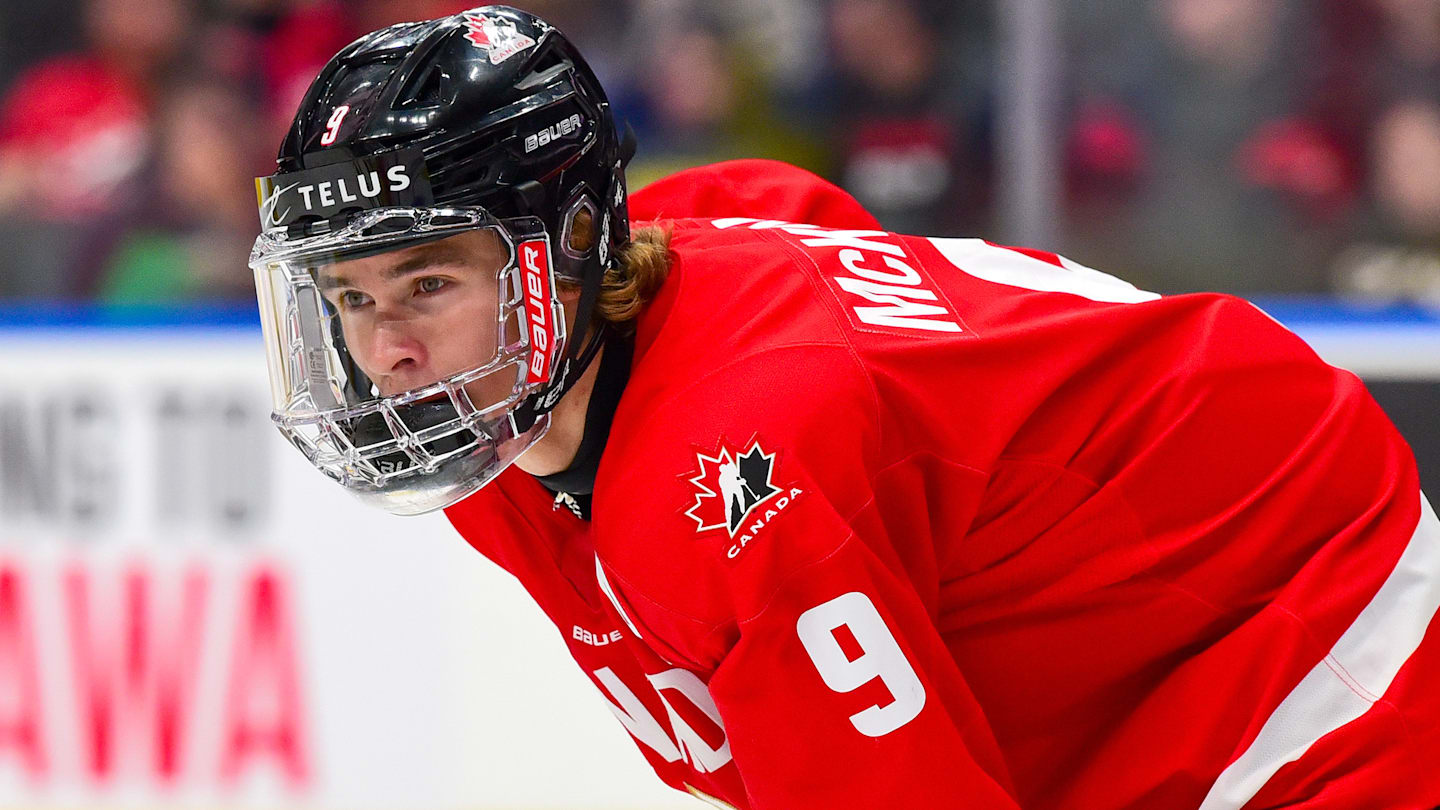
Future Penn State men’s hockey forward Gavin McKenna has a big year ahead of him. Not only is it his draft year, one where he’s projected to go No. 1 overall as of now, but it’s his first time playing in the NCAA. He told reporters on Tuesday, July 29 that the Nittany Lions will be a fresh start for him, a shift in his career to set him up for the long run as a pro.
McKenna committed to Penn State on July 8. The 17-year-old is coming to Hockey Valley off a 129-point 2024-25 season with the Medicine Hat Tigers of the Western Hockey League. However, he’ll need to adjust to the NCAA lifestyle from the new hockey regime to the campus life in itself. Head coach Guy Gadowsky said people shouldn’t expect McKenna to come out of the gate as Penn State’s top scorer from game one.
“The NCAA, it’s a bigger, heavier league. Obviously this summer’s a big one for me,” McKenna said. “I want to put on some weight . . . and [be] more pro ready . . . it’s a bigger game, faster game. I want to work on my speed.”
College will be his time to develop into a stronger and heavier player. McKenna said to reporters on Tuesday that the defensive side of his game, specifically, is what he wants to improve on. Since college is much more similar to the NHL than junior league hockey is to the NCAA, players can’t be one dimensional. Entering a year with a talented Big Ten, the conference will especially challenge the young talent in taking that next step in his game.
“The Big Ten’s pretty stacked this year,” McKenna said. “It’s going to be a tough conference, but I’m excited.”
He could have had a similar Big Ten experience as a Michigan State Spartan. But Penn State and McKenna’s goals and journey aligned, leading him to choose the Nittany Lions. Just how he plans on growing into a better player, though, he wanted to be part of a program that was growing into a competitive and serious entity in the college hockey scene.
“I’m kind of a guy who likes to pave his own path in a way. I think Penn State, the biggest reason I [committed] there was because [of] seeing what they did last year to go to the Frozen Four, being a newer type of school up-and-coming, it’s exciting being a part of that,” McKenna said. “I think they have a chance to win it, so that was a huge part of my decision and getting to play with some pretty amazing players . . . They’ve got the team to do it.”
-

 Sports2 weeks ago
Sports2 weeks agoAdapti, Inc. (OTC
-
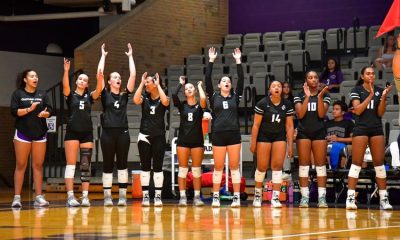
 Sports3 weeks ago
Sports3 weeks agoVolleyball Releases 2025 Schedule – Niagara University Athletics
-

 High School Sports1 week ago
High School Sports1 week ago100 days to men's college basketball
-
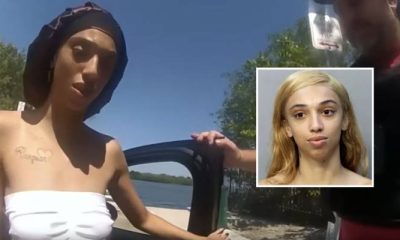
 Rec Sports2 weeks ago
Rec Sports2 weeks agoFlorida woman, 20, accused of pepper-spraying rich men in Miami Beach hotels, stealing their luxury watches
-

 Health2 weeks ago
Health2 weeks agoJoliet West alum's basketball clinic focuses on mental health as well as physical performance
-

 Youtube3 weeks ago
Youtube3 weeks agoShe will remember this forever 💪🙌
-
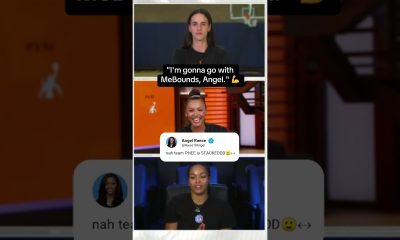
 Youtube3 weeks ago
Youtube3 weeks agoAngel Reese on Team Collier 👀
-
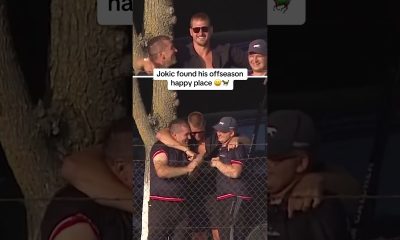
 Youtube3 weeks ago
Youtube3 weeks agoNikola Jokic was hyped after his horse won a race 🏆
(via @arenasporttv/TT)
-

 Youtube3 weeks ago
Youtube3 weeks agoDouble play but make it The Show 🔥
-

 Youtube3 weeks ago
Youtube3 weeks agoMichael Conforto hit the perfect blue on the meter with this throw to home 😮































